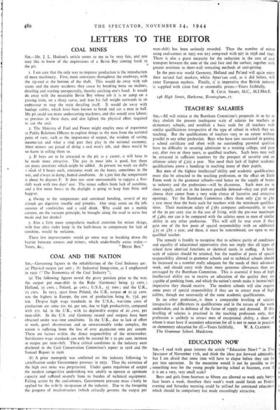COAL AND THE NATION
SIR,—Governing factors in the rehabilitation of the Coal Industry are-. (a) Physical output per unit ; (b) Industrial Integration, as I emphasised in 1930 (" The Economics of the Coal Industry ").
(a) The following figures reveal the grave position prior to the war, the output per man-shift in the Ruhr (Germany) being 33 cwts. ; Holland, 35 cwts. ; Poland, 4o cwts.; U.S.A., 5- tons ; and the U.K., 73 cwts. In 1913, apart front Poland, the U.K. output of 20.32 cwts. was the highest in Europe, the cost of production being 8s. 71d. per ten. Despite high wage standards in the U.S.A., war-time costs of production are some tos. 6d. per ton, due to high productivity, compared with 27s. 6d. in the U.K., with its deplorab!e output of zo .cwts. per man-shift. In the U.S. and Germany record coal outputs have been obtained under war-time conditions. In the U.K., due to lack of effort at work, grosli absenteeism and an unwarrantable strike complex, the nation is suffering from the loss of over 40,000,000 tons per annum. These are factors within the direct responsibility of the mineworker. Satisfactory wage standards can only be assured by a 5o per cent. increase in output per man-shift. These critical conditions in the industry were disclosed in the Coal Conservation Committee's report in 1918 and the Samuel Report in 1926.
(b) A price monopoly was conferred on the industry following its cartellisation under Government pressure in 1935. Thus the existence of the high cost mine was perpetuated. Under quota regulation of output the modern competitive undertaking was unable to operate at optimum capacity and suffered severely from its burden of technical equipment. Failing action by the coal-owners, Government pressure must c'early be applied for the ordediy integration of the industry. Due to the foregoing the progress of mechanisation (which critically governs the output per man-shift) has been seriously retarded. Thus the number of mines using coal-cutters in 1925 was 915 compared *ith 927 in 1938 and 1942. There is also a grave necessity for the reduction in the cost of coal transport between the zone of the coal face and the surface, together with greater attention to short-wall retreating methods of coal-getting.
In the post-war world Germany, Holland and Po'and will again enjoy their natural fuel markets, whilst American coal, as it did before, will Inter European markets. Finally, it is imperative that British industry is supplied with clean fuel at reasonable prices.—Yours faithfully,
R. CECIL SMART, M.C., M.I.Min.E.
146 High Street, Harborne, Binninghanz,17.


























 Previous page
Previous page